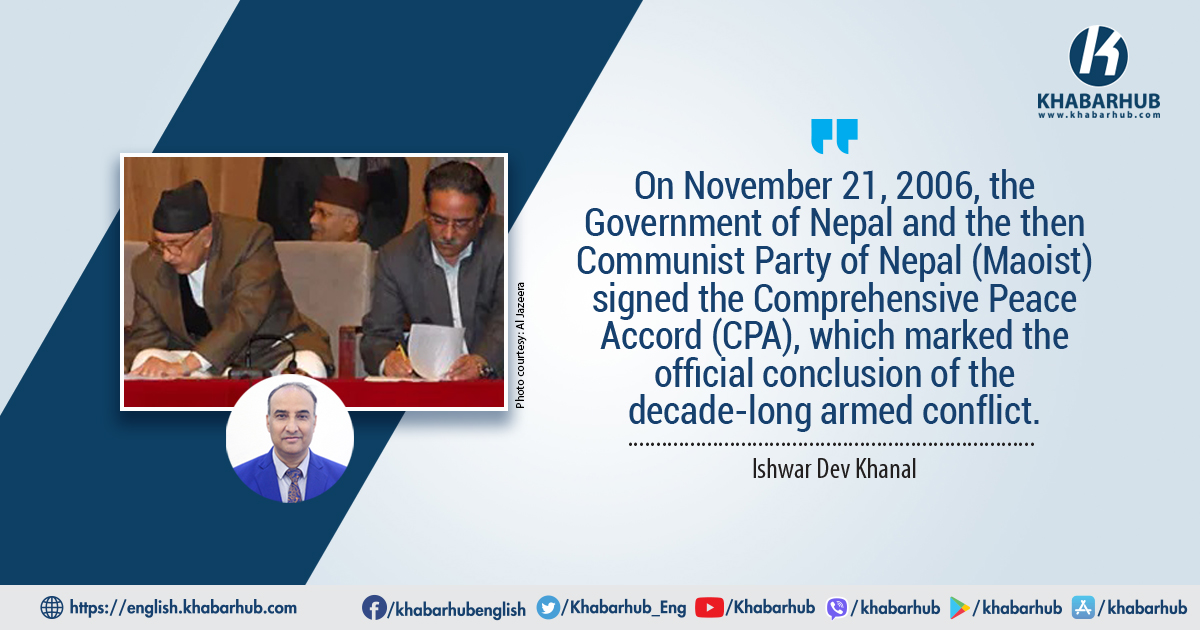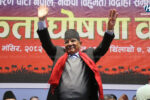KATHMANDU: The peace process dubbed as “exemplary to the world” has moved further towards a logical conclusion, something which Nepal had been longing for for quite some time.
The discussions and developments regarding the TRC Bill have been yet another milestone in Nepal’s peace process.
The fact that political leaders converged on this issue is a moment of historic unity and commitment to addressing the issues of conflict survivors.
The debate process and progression of Nepal’s peace process, underscored by the deliberations on the amendment bill to the Act on Investigation on Enforced Disappeared Persons and the Truth and Reconciliation Commission, 2079BS, marked a very historic moment in the political landscape of Nepal.
Moreover, this legislative progress is more than a technical adjustment; it has been an end product of giant efforts towards ensuring permanent peace and reconciliation in a country bled by years of incessant conflicts.
But debates on the TRC Bill in the House of Representatives Wednesday reflected how almost every senior leader was vying with each other to take credit for advancing Nepal’s peace process up to the present stage.
The emphasis that Nepal has paid to the survivor needs and justice delimited a wider consensus that, despite being on the road to progress, there exists an urgent need and requirement to address the remaining challenges effectively.
All of them tried to project themselves as the unsung hero of the decade-long Maoist insurgency as if their individual effort was the prime mover behind this collective success.
From Pushpa Kamal Dahal to Sher Bahadur Deuba, KP Sharma Oli, and Madhav Kumar Nepal, all of them presented themselves in working mode—full of energy and strategic brilliance—as if single-handedly they had steered Nepal from conflict to reconciliation.
Certainly, such collective self-congratulation underlined the paradox of this united front: all celebrated individually their pivotal roles, but in fact, the real credit belongs with the shared, at times messy process of political compromise and perseverance that made this milestone possible.
Historical and present-day context
The amendment of this bill is part of Nepal’s peace process, whose roots date back to the Comprehensive Peace Accord that was signed in 2006.
This accord brought an end to nearly a decade-long insurgency by the Maoists and established ground for transformation from a monarchy to a federal democratic republic.
The peace process has been mired with too many steps that have been taken and not addressed properly all these years, particularly with respect to the grievances of the conflict victims and survivors.
The objective of the TRC Bill is to amend the existing laws related to transitional justice and focus on an investigation into enforced disappearances, along with the proper functioning of truth and reconciliation commissions.
It was the Chairman of CPN-Maoist, Pushpa Kamal Dahal Prachanda, one of the signatories of the Comprehensive Peace Accord, together with then Prime Minister Girija Prasad Koirala, who termed this legislative development a big event to say that it marked the end of one chapter in Nepal’s political revolution.
According to Dahal, the importance of this moment as an institutional turning point lies in concretizing the gains of the peace process and pushing ahead for a brighter future. H
is reflections link him deeply to the historical and personal dimensions of the peace process with regards to his acknowledgement of Girija Prasad Koirala’s contributions and of the collective responsibility of current leaders in relation to upholding the spirit of the CPA.
The President of the Nepali Congress, Sher Bahadur Deuba, was also harping on the historic nature of this bill.
The Deuba remarks revealed unprecedented consensus amongst Nepal’s political parties and all stakeholders—this has been a very rare time when the heartwarming unity is expressed over any contentious issue.
From his side, Deuba sees the bill carrying all the critical values about transitional justice that truth-seeking and justice together with reparation for survivors are supposed to represent, according to international standards and judicial precedence.
According to Deuba, the bill is not a simple domestic need, but rather one designed to make Nepal a model in transitional justice globally.
Management of the TRC and various mechanisms for investigation; more importantly, sufficient reparation for the victims and the delivery of justice shall be ensured to make the process success.
Another interesting dimension in this discussion was the comments of Prime Minister KP Sharma Oli, who framed this process of peace as indigenously hatched with far-reaching milestones.
Such emphasis of Oli on the peace process as an example to the world at large was a matter of national pride for Nepal, and its particular way of resolving conflicts and seeking reconciliation.
In his assurance to facilitate the implementation of the laws once they are passed, he showed determination for the process to reach its complete and effective realization.
Not stopping here, Unified Socialist chairperson Madhav Kumar Nepal let out a more urgent tone, emphasizing that completion of the peace process will not be delayed anymore.
His call for action now underlined well the frustration during all these years when the survivors and affected communities had to wait.
The emphasis that Nepal has paid to the survivor needs and justice delimited a wider consensus that, despite being on the road to progress, there exists an urgent need and requirement to address the remaining challenges effectively.
Role of Political Consensus
The political consensus built up in advancing this bill is one major development in Nepal’s political culture.
Since the peace process, several political disputes and delays have occurred, but now the present unity among major political actors has shown indications of renewal for a commitment to resolve long-standing issues.
This consensus is not merely symbolic; it has the potential to have an impact on the real aspects of the peace process, in particular, the proper functioning of the TRC and other mechanisms related to it.
On the other hand, the passing of the bill by the process of the parliament with huge support showed collective recognition of the urge for justice and reconciliation.
Across-party lawmakers of Janata Samajwadi Party, Janamat Party, and Nagarik Unmukti Party were in favor of the bill, underlining its pivotal role for transitional justice and enhancing Nepal’s image at the international level.
The support turned out to be a unanimous perception toward the bill in overcoming past wounds and uniting the country.
Challenges and the Next Steps
After positive progress, still some of the challenges remain.
Although a step important is the approval of the Bill, the successful establishment and functioning of the TRC could have greater importance.
While the mere passage of the bill is a commendable achievement, real testing will come down to effective implementation of the provisions and sustained commitment by stakeholders for crystallizing justice and reconciliation.
Management of the TRC and various mechanisms for investigation; more importantly, sufficient reparation for the victims and the delivery of justice shall be ensured to make the process success.
There is therefore the potentiality for obstacles and delays in application, and alertness and sustained commitment from all will be needed to work through these difficulties.
The support the international community, including the United Nations, has provided, has very strongly helped the peace process in Nepal.
The outside validation has been a great boost to efforts within and underlined the necessity of holding on to international norms and values within the domain of transitional justice.
As Nepal continues to navigate the complexities of post-conflict reconciliation, the role of international support and scrutiny will necessarily be at the forefront.
Conclusion
In sum, deliberations and progress on the TRC Bill mark an important milestone in the country’s ongoing peace process.
What is rather most striking, however, is the coming together of political leaders on the issue, which reflects a nascent moment of unity reaching out to historic commitment toward tackling the needs of survivors of conflict.
While the mere passage of the bill is a commendable achievement, real testing will come down to effective implementation of the provisions and sustained commitment by stakeholders for crystallizing justice and reconciliation.
This, in turn, heightens the stakes of this moment for conflict resolution and transitional justice more generally by creating the possibility that Nepal could set a model for the world.









Comment